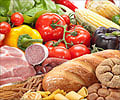Eating three square meals has become a problem for Britain's poor.

Twice a week, this place functions as a food bank serving up physical rather than spiritual sustenance to the increasing numbers of Britain's poor.
The economic crisis has left many people on the edge, but campaigners warn the situation is going to get worse because of government plans to cut welfare payments in the coming months.
"We are giving away over half a tonne of food every week at the moment, just here in Norwood. Over Christmas we gave away three tonnes in three days," said Elizabeth Maytom, who runs the Norwood and Brixton food bank at St. Luke's.
With its shelves stacked high with soup, beans, milk and pasta, most of which has been donated, St. Luke's is one of 300 food banks run in Britain by Christian charity The Trussell Trust.
More than 100 of these have been launched in the last year alone, feeding more than a quarter of a million people.
Although Britain is one of the richest countries in the world, the boom in food banks reflects the growing number of people struggling to balance their income with increases in rent, fuel and food costs.
The highly controversial proposals would see unemployment and child welfare payments go up by one percent a year until 2016, well below current inflation of 2.7 percent.
The move is part of a wider government shake-up of the welfare system intended both to save money and ensure people are better off working than staying at home on benefits.
Ministers say it will bring benefit increases more into line with wages, which have stagnated since the financial crisis.
But the Archbishop of Canterbury, Justin Welby, is among the critics, warning the change will have a "deeply disproportionate impact on families with children".
The Trussell Trust's executive chairman, Chris Mould, said millions of Britons are "only a pay cheque away from crisis", and this was likely to increase with the government's plans.
"What that means is the buying power of the poorest people in this country has been held below inflation, it's going to go down each year," he told AFP.
Benefits have historically risen in line with inflation and, without any change, would have been due to go up by 2.2 percent in April.
Thirteen million people in Britain -- or 21 percent -- live below the poverty line, a threshold measured at 60 percent of average income, according to official statistics.
At St. Luke's, women bring branded plastic bags or their own shopping trolleys which they pack with tins of food, toilet paper, washing powder and boxes of tea, so that outside on the street, strangers would have no idea that they hadn't bought the items themselves
On the day that AFP visited, a woman who didn't want to be named waited with a cup of hot tea as enough food for three days was heaped into her bags.
After paying her weekly bills, she routinely has nothing left with which to feed her family until her next benefit payment arrives.
"If this place wasn't here, I wouldn't have been able to have anything for the children and my kids would have had to go without for three days," she said.
"The money that you are getting isn't actually covering the food that you need because the prices are going up," she said.
"It's hard to tell three young children,'mummy's got no food'."
The welfare cap will contribute nearly £2 billion (2.2 billion euros, $2.9 billion) to Britain's recession-hit public coffers.
But ministers insist that those most in need -- the disabled and those reliant on state pensions -- will continue to see their payments rise in line with inflation.
According to the minister for pensions Steve Webb, it's about making it "pay to work".
"In difficult economic times we've protected the incomes of pensioners and disabled people who have little means to increase their income," he said.
"We have also committed to helping people who rely on working age benefits and tax credits and will increase that support by one percent."
Source-AFP
 MEDINDIA
MEDINDIA




 Email
Email










